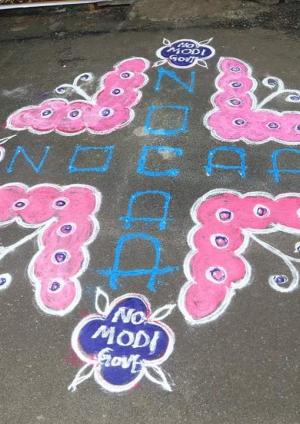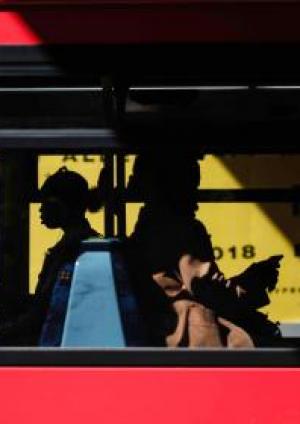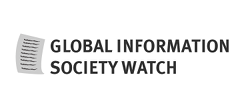This edition of GenderIT gathers a series of reflections inspired by the first Making a Feminist Internet in Africa regional convening. Feminists from eighteen African countries came together to discuss what the internet means for their lives and centre the voices of African women.
In these difficult and weird times, many people and organisations are adjusting to situations of remote working and working from home. Even for groups who are accustomed to online communications, the switch to full remote working may be a challenge.
In these exceptional times, APC wishes to send our solidarity and appreciation for connecting with us. While we are distancing ourselves physically, we continue to stay closer than ever to each other and share tools and resources as well as support.
 Connecting the Unconnected: Supporting community networks and other community-based connectivity initiatives
Connecting the Unconnected: Supporting community networks and other community-based connectivity initiatives
This project will contribute to an enabling ecosystem for the emergence and growth of community networks and other community-based connectivity initiatives in developing countries. It is part of a multi-year, multi-donor strategy envisaged to address the human capacity and sustainability challenges, along with the policy and regulatory obstacles, that limit the growth of community-based connectivity initiatives.
 Challenging hate narratives and violations of freedom of religion and expression online in Asia
Challenging hate narratives and violations of freedom of religion and expression online in Asia
This project seeks to protect and promote respect for freedom of religion and expression on the internet, particularly by countering hate speech online on the basis of religion, and generating narratives and discourse that defend secular and diverse opinions touching upon religion. The three-year project focuses on five countries in South and Southeast Asia: Bangladesh, India, Indonesia, Myanmar and Pakistan.
 FIRN: Feminist Internet Research Network
FIRN: Feminist Internet Research Network
The Feminist Internet Research Network is a three-and-a-half-year collaborative and multidisciplinary research project led by APC, funded by the International Development Research Centre. The project draws on the study “Mapping research in gender and digital technology”, and the Feminist Principles of the Internet collectively crafted by feminists and activists, primarily located in the global South.
Global Information Society Watch (GISWatch) is an annual report co-produced by the APC network and partners, which looks at the progress being made in creating an inclusive information society worldwide (particularly in implementing WSIS goals), encourages critical debate, and strengthens networking and advocacy for a just, inclusive information society.
This is the third in a series of blogs about implications of the corona virus for the digital society. This week, some thoughts on future governance. Part two of these next week.
The coronavirus pandemic isn’t a purely medical issue, it entangles all aspects of human lives, including our privacy, protection and dignity.
In the current corona crisis, it’s important that we focus on the future as well as on the present. The digital will play a big part in recovery.
Columns

David Souter writes a column for APC twice a month, looking at different aspects of the information society, development and rights. David’s pieces take a fresh look at many of the issues that concern APC and its members, with the aim of provoking discussion and debate. Issues covered include internet governance and sustainable development, human rights and the environment, policy, practice and the use of ICTs by individuals and communities.
The undersigned organisations express their concern over the announcement of the use of satellite monitoring and georeferencing systems to track individuals as part of the disease containment measures established in Ecuador to confront the COVID-19 epidemic.
This report presents an overview of the third edition of the Community Network Exchange (CNX) held in December 2019. The three-day summit in southern India brought together practitioners of community networks and community radio stations from 12 countries in Asia and South America.
APC and the Myanmar ICT for Development Organization thank the Special Rapporteur for her report on the situation of human rights in Myanmar, particularly for highlighting how ICTs are being leveraged to perpetuate violations against religious minorities such as the Rohingya.
In this statement delivered during the 43rd session of the UN Human Rights Council, APC speaks to the deteriorating political situation in India and the increase in violence following the enactment of the Citizenship Amendment Act.
In this statement delivered during the 43rd session of the UN Human Rights Council, APC welcomed a gender perspective being integrated into the work of the mandate of the Special Rapporteur and the adoption of intersectionality as a framework in the digital age.
Since December 2019, peaceful protests have erupted throughout India in response to the adoption of the controversial Citizenship Amendment Act. In response, India has witnessed large-scale violence against dissenters and a clampdown on freedoms of religion, expression, assembly and association.
At the 43rd session of the UN Human Rights Council, states will consider a resolution extending the mandate of the Special Rapporteur on the situation of human rights defenders for three years. Civil society organisations including APC are calling on all states to support the extension.
Ola Bini is a computer expert and human rights defender recognised worldwide, who is facing a political-judicial process in Ecuador since April 2019. In regards to this, Ecuadorian and international civil society organisations have decided to attend, as observers, the preparatory hearing and tria...
























